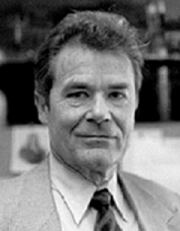
Stanley Stewart
Professor of English
Stanley N Stewart, Distinguished Professor of English at UC Riverside, died after a very brief illness on February 9, 2016. He was almost 85 years old, and though he occasionally mentioned retiring once he turned 80, he so loved research and teaching that he invariably deferred that decision for another year.
Professor Stewart was born in Minneapolis on June 5, 1931, but grew up in Los Angeles. He joined the Navy, then pursued his B.A., M.A., and Ph.D. in English from UCLA and was a lifelong fan of their football team. He was an athlete himself, enjoying skiing, horseback riding, and tennis, playing with and against many campus colleagues, and he also sang in his church’s choir. He came to UC Riverside in 1961, some half a dozen years after it had transmogrified from citrus experiment station to a small, liberal arts college and just two years after UC President Clark Kerr had designated it a “general university campus” in anticipation of the tidal wave of baby boomers he knew would flood the system. Serving UC Riverside for nearly 55 years, Professor Stewart saw it grow many times larger and transition from what was once dubbed the “Swarthmore of the West” to a full-fledged UC with robust graduate programs.
Professor Stewart was an accomplished scholar, with an interest in literary history and form and its relation to intellectual history, as well as the value—and pleasure--of careful close-reading. His expertise was in 16th and 17th century British literature, especially the work of the 17th-century poets and clerics Thomas Traherne and George Herbert, and their coevals, poet and polemicist John Milton, and poet and politician Andrew Marvell, and the poet and dramatist of the preceding generation that included Shakespeare, Ben Jonson. For many years, he was coeditor, with Robert Evans, of The Ben Jonson Journal, and he also served on the editorial boards of John Donne Journal and Cithara: Essays in the Judaeo-Christian Tradition. He belonged to numerous professional organizations, among them the Modern Language Association, the Milton Society, the John Donne Society, the Renaissance Society of Southern California, the Renaissance Society of America, and the Association of Literary Scholars and Writers, serving the latter as vice-president, then president.
His publications are numerous: over nine single-author or co-authored scholarly books and dozens of articles. His first single author monograph, The Enclosed Garden: The Tradition and the Image in 17th Century Poetry, appeared in 1966 as a defining study of early modern visual and poetic images of the garden and argued that the meanings of garden poetry, such as Marvell’s difficult “The Garden,” are enriched when the work is read closely in its literary, aesthetic, and intellectual historical context, attending especially to the biblical Song of Songs as a source text. His last, Shakespeare and Philosophy, appeared in 2010 and was inspired by Professor Stewart’s interest in the latter part of his career in the ordinary language philosophy of Ludwig Wittgenstein, which he saw as a corrective to the ideas of some of the new schools of literary theory and criticism of the post-war period that he thought moved too far afield from a focus on literature as literature. In that volume, he also addressed the role of Shakespeare in the thinking of philosophers besides Wittgenstein, including Hume, Kant, Kierkegaard, and Nietzsche.
His other book publications include a study of the criticism of Renaissance literature also influenced by his interest in Wittgenstein, Renaissance Talk: Ordinary Language and the Mystique of Critical Problems; analyses of the poetry of Traherne and of Herbert, The Expanded Voice: The Art of Thomas Traherne and George Herbert; a composition and creative writing text, The Unity of Prose: From Description to Allegory; a novel, The King James Version; and three co-authored volumes, Nietzsche’s Case: Philosophy as/and Literature, Jonson’s Spenser: Evidence and Historical Criticism, and Caped Crusaders 101: Composition Through Comic Books. He is in addition the co-editor of The Cambridge Companion to Ben Jonson. His scholarly achievements were recognized with a Guggenheim Fellowship and a Mellon Grant, as and he was chosen as the UC Riverside Faculty Research Lecturer in 2000. In 2009, the Ben Jonson Journal honored his contributions to Jonson scholarship and teaching with a festschrift issue that included fourteen essays inspired by his work over the years.
Students found Professor Stewart inspiring no matter what he taught, from the required lower-level survey of British literature to graduate classes on Shakespeare. He brought his deep knowledge of his field to his classes, as his undergraduate and graduate students regularly pointed out on evaluations, though they also noted his passion and warmth. A student in a Shakespeare course described him as a “walking Shakespearean Encyclopedia,” while another averred, “He made me feel like an Elizabethan.” In one of his final course evaluations, a student summed up his teaching style, writing, “Dr. Stewart embodies what a teacher should be: Informative, kind, receptive, encouraging, intellectually challenging, dignified, confident, empathetic, responsible, and witty. Not all teachers on this campus can claim all these at once.” Not surprisingly, he was selected for the campus Distinguished Teaching Award. In keeping with his commitment to teaching, his first concern when he was hospitalized at the start of winter quarter 2016 was finding someone to take over his courses for the rest of the term.
He is survived by his wife of 55 years, Barbara; their sons Brad and Duncan and Brad’s wife Brenda; his six grandchildren and five great-grandchildren; and his brother and sister.
This memorial was prepared by Carole-Anne Tyler, Associate Professor of English, with information from colleagues in the UCR English Department; The Ben Jonson Journal: Talking Renaissance Texts: Essays on the Humanist Tradition in Honor of Stanley Stewart, 16:1-2, May 2009, viii-x, available online at https://www.euppublishing.com/toc/bjj/16/1-2; and Stan Stewart’s “The President’s Column,” ALSC Newsletter, 8:3-4, Fall 2002-Winter 2003, 2.